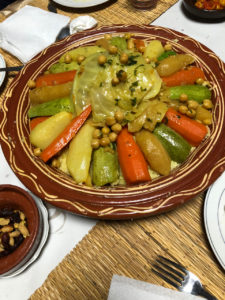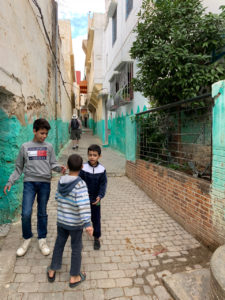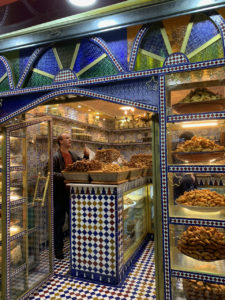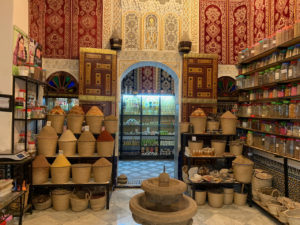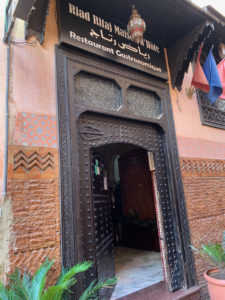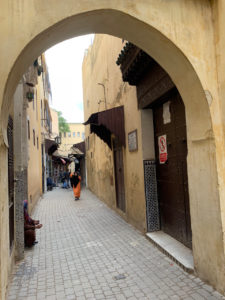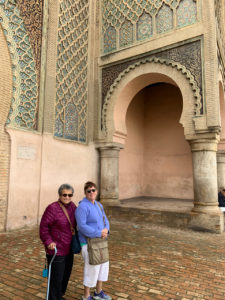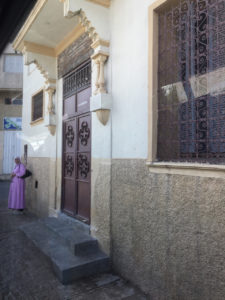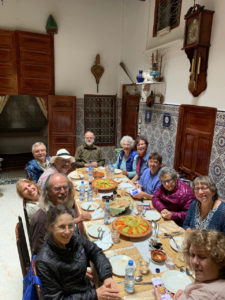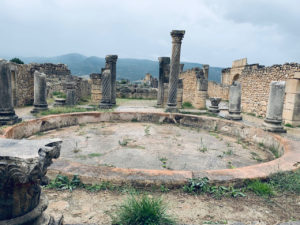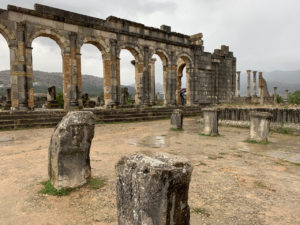The light rain contains its own beauty as well as perils as we drive through winding roads on the way to Meknes. A beautiful full double rainbow appears over fields of olive trees and rounded hills, so clear and sharp we believe we can see where the end is touching the ground. But the rain makes driving, even on the relatively well maintained roads of Morocco, a challenge for our experienced driver. We stop at various roadside places for rest breaks and the bathrooms here are, for the most part, clean and workable. In front of us on this road were two heavy trucks completed overloaded with hay and lurching on the windy road. We applauded when our driver eventually passed by both of them.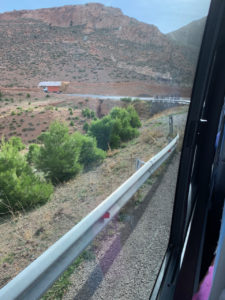
We see storks throughout the countryside and city, nesting on roofs and towers.
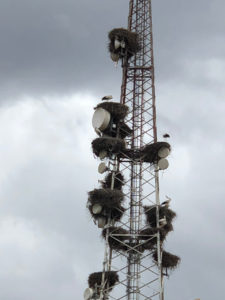
In Meknes, our guide assists us to find the main square in the old Medina where there are crowds of people, mostly men, and even a snake charmer.
We walk to a small family-run restaurant, the Yal Halla, where we sit and talk and laugh while a fabulous meal is presented to us. For me, as a vegan, there is little variation in Morocco: it is a vegetable tagine, cooked in a covered clay pot, with carrots, pumpkin, turnip, green zucchini and sometimes green beans or a vegetable couscous dish with the same vegetables. I have now learned ask for almonds and prunes to be added so I get a little protein with my meal but after a few days it does get a little boring. This night, however, the tagine was unusually good. The omnivores have also been eating the same tagines and couscous except with chicken, lamb or beef, or, as this night, a pastille, which is flaky pastry filled with vegetable and meat with a topping here of fresh cinnamon and some sugar. It smelled wonderful.
Our tour the next morning around Meknes took us to an overlook of the city and then into the Medina, to walk around its ancient winding streets and see some of the older way of life. Our local guide was raised here and we walked through narrow streets which we are told were part of the originally Mellah area of the many Jews who settled here and in Fes over many centuries, in two main waves, in ancient times fleeing Egyptian and later Roman persecution and then after the European inquisition of 1492.
The color everywhere is brown and ochre with an occasional splash of color. Men and women pass us by, the younger men in jeans and t-shirts and the older men in the traditional jellaba and women in long skirts or pants, often with scarves. Donkeys remain a main beast of burden, the main way to transport heavy items through the small streets, which makes it necessary to watch your step while walking.
We passed by an old synagogue which we were uncertain whether it was still in use.
Leaving Meknes, we travel to a small village, Moulay Idris, known as the home village of the importer of Sunni Islam from Iraq and where he is buried. The village winds around a hilltop and we climb up, past children and the many donkeys carrying the results of shopping trips to the markets. At a guest house, we are greeted by our cost and sit around a large table in the main room, where we are treated to couscous cooked by the women over the last 3 hours, warm soft and moist, of a different character than the commercial variety we have previously eaten.
This village, given its close location to Volubilis, a center with archeological ruins, was probably originally settled by descendants of the Roman colonizers. So many civilizations have passed through this part of the world, flourished and grew and then returned to dust, although the native Berbers, originally nomadic tribes, have hung on to their ethnicity. Volobuilis was once a large city which grew around a Roman garrison town, protecting its interest in the olives groves it planted in the region and which was important for its trade.
Some impressive ruins remain, including floor mosaics so endemic to the villas of the rich and important Roman settlers. There are a few still standing temples and large buildings, mostly the foundation of once significant buildings. It starts raining while we are walking around with our guide, some of us get very wet, but it stops quickly as we rejoin our van and head toward Fes.



